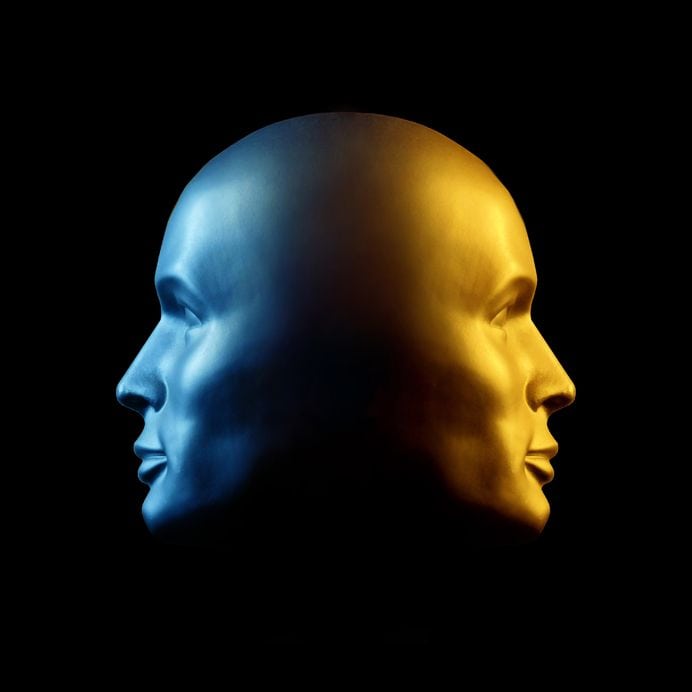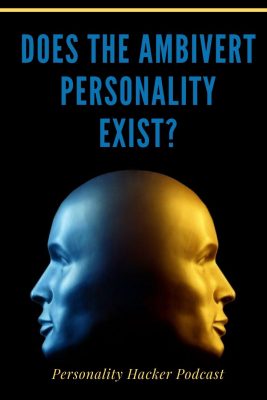Download Episode Here – right click link and select “Save Link As…”
In this episode Joel and Antonia talk about the ambivert personality and whether or not it exists.
In this podcast on the ambivert personality you’ll find:
- What is an Ambivert Personality? Does it really exist?
- All of us have one introverted and one extraverted process in dealing with the mental world
- Example: ENFP. Extraverted Intuition/Introverted Feeling
- Both introverted and extraverted processes are important and as you grow and develop these processes, the more you appear as a person with an ambiverts personality.
- We generally assume that extraversion means social (extraversion with people) and we assume that introversion excludes other human beings. However there are mental processes that are extraverted but are not social, and there are introverted processes that necessitates getting in touch with people.
- Ambiverts are the ones that who have a strong association of these two processes. They can see the part of them that is both extraverted and introverted.
- Don’t mistake your identity to a four-letter code, that’s a starting place of understanding how your mind works. You are way more than what any personality system can type you. Don’t assume that it explains everything about you.
- Your co-pilot is the highest leverage growth opportunity for you. The point of the map is to simplify.
- You need different styles of maps for understanding personality development and how your mind works.
To subscribe to the podcast, please use the links below:
Subscribe with iTunes
Non iTunes Link
Download The Android App
Subscribe on Soundcloud
Subscribe with Stitcher
If you like the podcast and want to help us out in return, please leave an honest rating and review on iTunes by clicking here. It will help the show and its ranking in iTunes immensely! We would be eternally grateful!
Want to learn more?
Discover Your Personal Genius
We want to hear from you. Leave your comments below…



Share:
Podcast - Episode 0043 - Permission To Be Awesome
Podcast - Episode 0045 - Developing A Generosity of Spirit
19 comments
So if a person exercises both their driver and copilot enough could they switch seats? Become fluid enough they could identify with both the E and I profiles of their preferred styles? Say An INFP could also identify with an ENFP?
A Guest:
Although I am not a fan of Jung and have zero training as a therapist I thoroughly understand the functions as do numerous Jungian psychologists who object to the construct of the MBTI. It’s not rocket science.
CAPT, the organization that promotes the MBTI, has too much invested in their marketing organization to give unbiased information on their test. Mahlberg, Burney, June Singer, Mary Loomis have published serious critiques of the MBTI. Take the time to investigate the SLIP (Singer-Loomis-Inventory of Personality). Better yet take the test. It constructs it’s questions based on a Likert scale of 1 to 5 showing degree of agreement.
My objection to podcast 44 is that it discourages people from understanding that extroversion and introversion can both be independently expressed in terms of degree like everything else in nature. If your score is equal on the test neither dominates at the point in time you take the test. At best it would mean a person is moderately extroverted and moderately introverted which would best be simply described as ambiverted. It changes the calculus to one of flexibility. If you are fairly balanced on extroversion/introversion why not just acknowledge that as the way you are? Ambivert.
The appeal to the hierarchy of functions is an attempt to get around the errors of Jung’s scheme. If the MBTI is not an either/or system why is it that you can’t have the following function hierarchy.
Se Ne Fi Ti . What proven data says that if the dominant function is extroverted then the Auxiliary function MUST be introverted.
What is ignored is the possibility that S and N are inherently always extroverted and F and T are always by nature introverted. What is called introverted Sensation would actually be someone whose hierarchy of functions are as follows S F T I. This would be the case if on a scale of some sort the F and T (both naturally introverted) exceed the value of S. I don’t expect anyone to understand this especially if you have been immersed in Jungian typology. Stated simply you need to understand Introversion and Extroversion as an emergent trait based on the the hierarchy of the functions and the relative value of each function.
Mbti theory is not an either or system. It doesn’t claim that you are either an intuitive or a sensor. It only claims that you have a preference for one function over another. As an intp I have sensing and intuition in my function stack. It just happens that I prefer extroverted intuition more over my introverted sensing. A better understanding of function theory will help in understanding the nuances in the overall mbti theory.
The reason I have trouble with the MBTI is that it is an either/or structure. Nature doesn’t work that way.
Nature doesn’t work that way. For an example consider the weather. Suppose you applied the either/or model to weather prediction. You decide 50 degrees Fahrenheit is the midpoint for temperature. You make the midpoint for humidity 50%. You make the midpoint for wind speed 25 miles per hour. There is no partly cloudy. The sky is either sunny or overcast. The weatherman looks at the data and discovers it’s 52 degrees, the humidity is 55% the wind is 19 miles per hour and there are clouds low on the horizon. So how does he describe the weather?
“Today its going to be overcast, hot and humid with a light breeze”
You quote Korzybski. But he had a lot more to say than “the map is not the territory”. He encouraged “degree” thinking. Things are on a continuum. Why do you dance around the fact that everyone is introverted or extraverted to some degree. Those who are extreme extraverts aren’t going to be extreme introverts. However, when you are very close to a match on the two it would be appropriate to refer to this conditions as ambiversion. All it means is that the two characteristics are so close that a test score might be ambiguous.
There is a unique beauty that emerges from this situation. Antonio said the two would be battling it out. What happens in a tug-o-war where both sides are very closely matched? Quite often the results are determined by environmental factors such as wind, unevenness of the playing field, one side has the sun in their eyes etc. This is another way of describing “adaptation”. If a person is pretty close on both extraversion and introversion it makes the results more adaptable because there are more possibilities. The same can be said about any of the dichotomies including the so-called cognitive functions. Feeling and thinking, Sensation and Intuition.
That’s why tests have shown that people who are close on extraversion and introversion make better sales persons especially when dealing with products or services that require flexibility in customer relations.
Part of the problem with Jung is that he was in love with the four quadrant structure. This leads to his diagram of intersecting lines of Sensation/Intuition and Thinking/ Feeling. A triangle would be a better diagram. (Buckminster Fuller would agree). Think of feeling, thinking, sensation being the three corners of the triangle. Intuition would be right in the middle of the triangle because the middle is super-connected and intuition is all about connectedness.
You combine the measures of Intuition and Sensation to express the degree of extraversion and introversion would be the sum of the thinking and feeling dimensions. Which ever sum is the highest that would probably be the dominant. This is much simpler than trying to explain things away with the cognitive function explanation. Cognitive functions are based on some things Jung said in a very brief sentence and his followers made a religion out of it.
Thanks Leon for the support.